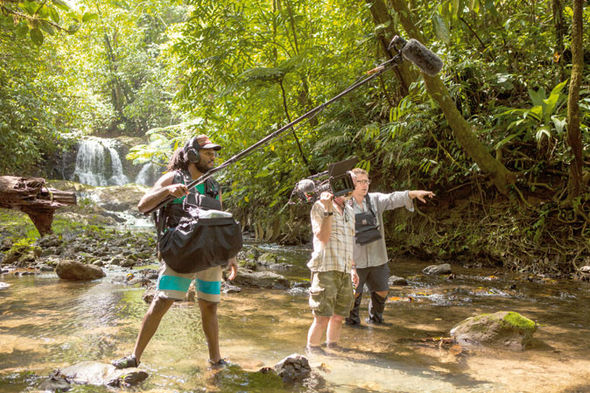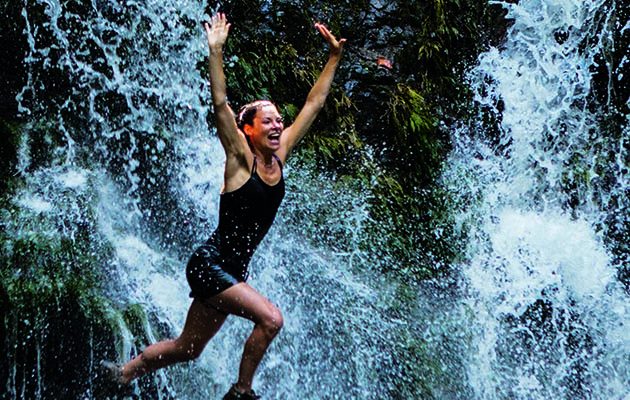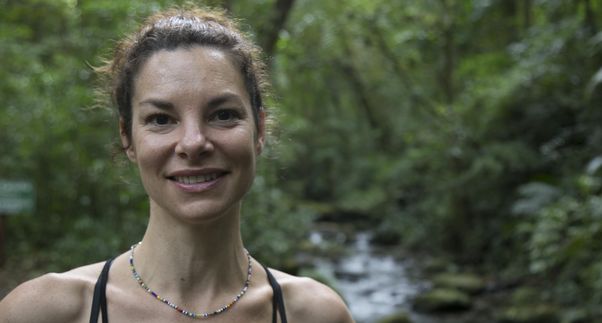Costa Rica Entertainment – Gaia Vince believes Costa Rica is the greenest and happiest country in the world, so she moved to a house in the jungle with her family for three months to find out why.
 The result is Escape to Costa Rica, a new series on Channel 4 (Sundays, 7pm), which sees her wrestling crocodiles and dangling from extremely tall trees. She tells us why this tiny country in Central America should be on the bucket list of every eco-minded traveller.
The result is Escape to Costa Rica, a new series on Channel 4 (Sundays, 7pm), which sees her wrestling crocodiles and dangling from extremely tall trees. She tells us why this tiny country in Central America should be on the bucket list of every eco-minded traveller.
Why Costa Rica?
It shows there is a different path you can take: you can develop your economy and increase the happiness of the people and conserve your natural environment. That’s the Holy Grail isn’t it? We all want to do that and yet we’re not. And it didn’t just happen by accident in Costa Rica. They decided to do it.
So I was really fascinated to go to a country that has managed to achieve this to find out why and how. What the conflicts are and how they resolve it. Also it’s the most beautiful country. They’ve got incredible coastline on both sides – the Pacific and the Caribbean – and strings of volcanoes, amazing rivers, tropical rainforests, cloudforests, sloths, monkeys. They’ve got indigenous culture as well as the postcolonial Latino culture.
What’s so green about it?
They used to be one of the most deforested nations in the Americas and they’re the only one that’s managed to reverse deforestation. They also banned hunting. Almost all their electricity is now run on renewables and 25% of the land is protected. They invest in social projects. Healthcare and education is really good. They always come out near the top in the world happiness index. It’s just really inspiring.
Is the average Tico green-fingered?
They have this great connection with nature. It’s not just some propaganda on the part of the government. People really feel this. They really respect their natural environment. There isn’t a lot of pollution or rubbish strewn everywhere. Compared to almost every other developing country I’ve been around the world, it’s extraordinary.
But the whole country can’t be an eco-paradise?
They’ve dedicated certain areas to a mass tourism market. It’s not the Costa del Sol but it is lots of hotels on the beach, bars, that kind of thing. There are a few beaches for that and lots of American students go there in spring break and get drunk. But it’s very carefully controlled and kept to certain areas. If you want that kind of holiday you can still get it, but it’s kept to those beaches.
Planning restrictions are much, much harder where they want to protect the wildlife and keep it looking beautiful. You’re not allowed to do excessive development.
The treehouse hotel in episode one looks amazing. What was your favourite eco-accommodation?
Staying in the rainforest in a little wooden cabin. It was full of mosquitoes and it only had cold water but you were surrounded by forest. You looked out of the windows and there were really exquisite birds chattering in the trees. My son had his fourth birthday there.
Most people would assume you can’t do that kind of trip with young children. How did you manage?
My kids were one and three when we went out. That means you have to have naps a lot; you have to carry them a lot; you have to have nappies and somewhere to change them. The paraphernalia that goes with kids can be problematic, but you just do things more simply and you’re less ambitious.
If it were just my partner and I, we would have been doing 10-hour hikes a day and camping. But we’re happy with a one to two-hour hike a day. We still get to see things and they get to see things and that’s really important to me. It’s their planet to inherit. They live in London and I don’t want it just to be something they see on TV that doesn’t really affect them or have any interest for them. I don’t know if they’ll remember any of it but I hope they remember the attitude.
What’s the food like?
The food has a spicy creole twist. The main dish is casada and I lived off it: rice, beans, vegetables, salad and either fish, chicken, beef, pork. It’s really tasty, really nutritious, and that’s probably why they live so long. Costa Rica is one of the world’s few blue zones – where lots of people live for more than 100 years.
Any other secrets to their longevity?
They walk a lot. There’s a really strong sense of community and of their own culture. They are involved in their natural world in different ways and the land is really important to them. I don’t know how much of that helps them to live longer but it feels like a much richer way of life than the fast-paced, urgent lifestyle that I often get trapped into in London.
So you’d recommend it to adventurous or eco-minded travellers?
Definitely. If you’re into adventure tourism, there are volcanoes to explore, rapids you can do down. I went down a really fast-flowing river in an inflatable boat – quite terrifying but also really exhilarating.
If you want to see wildlife, the Caribbean coast is just incredible. We stayed in Cahuita for a bit where you look out of your window and there’s a sloth or toucans sitting in the tree. And the Osa peninsula is a really special place – plunging waterfalls, jaguars, beautiful rainforest.
Standout moment?
Being on a newly erupted volcano. I’ve been to volcanoes before, but I’ve never been in a dead zone before and that was amazing. It was like being on the moon or a post-apocalyptic world. Our planet is so dynamic and to be confronted with that energy – the core of the Earth on the surface – was incredible.
Escape to Costa Rica is on Channel 4 on Sundays at 7pm
By By Claire Webb, Radio Times

